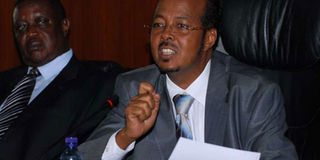MPs pass new law to silence voters from questioning them

Eldas MP Adan Keynan (right). Parliament passed a law to protect MPs from public scrutiny and limit media coverage. Mr Keynan, the mover of the Bill, appeared helpless on the floor of the House after he was overruled by his colleagues on October 14, 2015. PHOTO | SALATON NJAU | NATION MEDIA GROUP
What you need to know:
- A journalist deemed to have “scandalised” Parliament will be fined Sh500,000 or jailed for two years.
- MPs are also notorious for awarding themselves big salaries and changing the law to suit them, issues that will become increasingly difficult to report about.
- The mover of the Bill, Eldas MP Adan Keynan, appeared helpless on the floor of the House after he was overruled by his colleagues.
Parliament on Wednesday passed a law to protect MPs from public scrutiny and limit media coverage.
The proposed law introduces a new offence called “scandalising Parliament” and prescribed tough penalties to go with it.
A journalist deemed to have “scandalised” Parliament will be fined Sh500,000 or jailed for two years.
This means that reporters will be afraid to investigate issues such as the wanton corruption among MPs, which saw Parliament’s top watchdog committee, the Public Accounts Committee, reconstituted and the old members removed en masse.
MPs are also notorious for awarding themselves big salaries and changing the law to suit them, issues that will become increasingly difficult to report about.
The Constitution guarantees the public’s right to know and that of the media to report.
In a democracy, those who are put in charge of public affairs are required to be more open to scrutiny than private citizens.
OVERWHELMING ENDORSEMENT
However, it is not clear how and when one can be deemed to be guilty of defaming or scandalising Parliament.
Most of those who supported retaining the clauses were MPs affiliated with Cord.
Before the Bill was put to the vote, National Assembly Majority Leader Aden Duale had argued that lawmakers should allow the public to scrutinise their performance.
MPs overwhelmingly supported the Bill, which will become law if President Uhuru Kenyatta assents to it.
In the past, MPs have complained about media reports on their expenditure, including their penchant for awarding themselves huge perks, which are exempt from taxation.
The fear is that the Parliamentary Powers and Privileges Bill is open to abuse by the Parliament itself, because it is open to interpretation on what constitutes libellous reporting.
The other danger is that any person, including a citizen, who protests against the actions of MPs, and in the process utters words that the legislators consider libellous, also risks being fined and jailed.
This would apply, for instance, to the activists who painted the words “MPigs” on pigs let lose outside the National Assembly after lawmakers awarded themselves higher pay in May 2013.
TAKE RESPONSIBILITY
The same would apply to any person who publishes a pamphlet or documentary that MPs deem scandalous.
The mover of the Bill, Eldas MP Adan Keynan, appeared helpless on the floor of the House after he was overruled by his colleagues.
Mr Keynan had on Monday said that he had reflected on the contentious clauses and that he hoped his colleagues would approve the amendments.
“I can assure you this will go through. I know exactly what to do just leave it to me,” he had said after announcing that he had deleted the two clauses from the Bill.
Besides voting to retain the clause, the MPs also voted to strike out the proposed office of Standards and Ethics, commonly known as the Ombudsman, which was meant to check the conduct of the legislators and propose sanctions against offenders.
MPs who supported that clause said they would be helpless if false reports were written about them.
Kwanza MP Ferdinand Wanyonyi said sometimes inaccurate information was put to the public that embarrassed MPs and the media got away with it.
“If we pass this clause, it will open the door to all Toms, Dicks and Harrys to write false and inaccurate information regarding members,” he said.
Endebess MP Robert Pukose also supported retaining the clause, saying journalists, like other professionals, should take responsibility for their actions.
ATTACK ON DEMOCRACY
Seme MP James Nyikal said the clause would guard against reporters peddling falsehoods, saying media practitioners should not be allowed to get away with scandalous reporting.
Rarieda MP Nicholas Gumbo said failing to pass the law would open Parliament to mob justice where all manner of scandalous information would be piled against members.
“It is a good clause and I totally oppose its deletion,” he said.
Mr Duale and Mr Keynan were among the few who supported deleting the controversial clause, but they were drowned out by those supporting its retention.
Mr Duale said the provision was “scandalous” and wondered how a person would be said to have committed a crime by publishing parliamentary reports.
Reacting to the decision, the chairman of the Media Owners Association, Dr Hannington Gaya, said the passing of the Bill was an attack on civilised and democratic society.
He said the implications of the MPs’ actions were “extremely dire” for freedom of expression and the well-being of Kenya.
“This exemplifies the low level of our parliamentary engagement,” he said in a statement.
He said Parliament’s action had taken Kenya back several steps and called on President Kenyatta not to sign the Bill into law.
The chairman of the Kenya Parliamentary Journalists Association, Ms Roselyne Obala, asked why MPs came up with the law when there is already one on defamation.




